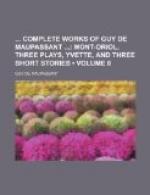He had had the good luck to be persecuted, to be in the eyes of the people, the incarnation of that lying formula which appears on every public edifice, of those three words of the Golden Age, which make those who think, those who suffer and those who govern, smile somewhat sadly, Liberty, Fraternity, Equality. Luck had been kind to him, had sustained, had pushed him on by the shoulders, and had set him up on his pedestal again when he had fallen down, like all idols do.
He spoke and he wrote, and always in order to announce the good news to all the multitudes who suffered—no matter to what grade of society they might belong—to hold out his hand to them and to defend them, to attack the abuses of the Code—that book of injustice and severity—to speak the truth boldly, even when it lashed his enemies as if it had been a whip.
His books were like Gospels, which are read chapter by chapter, and warmed the most despairing and the most sorrowing hearts, and brought comfort, hope and dreams to each.
He had lived very modestly until the end, and appeared to spend nothing; and he only kept one old servant, who spoke to him in the Basque dialect.
That chaste philosopher, who had all his life long feared women’s snares and wiles, who had looked upon love as a luxury made only for the rich and idle, which unsettles the brain and interferes with acuteness of thought, had allowed himself to be caught like an ordinary man, late in life, when his hair was white and his forehead deeply wrinkled.
It was not, however, as happens in the visions of solitary ascetics, some strange queen or female magician, with stars in her eyes and witchery in her voice, some loose woman who held up the symbolical lamp immodestly, to light up her radiant nudity, and the pink and white bouquet of her sweet-smelling skin, some woman in search of voluptuous pleasures, whose lascivious appeals it is impossible for any man to listen to, without being excited to the very depths of his being. Neither a princess out of some fairy tale, nor a frail beauty who was an expert in the art of reviving the ardor of old men, and of leading them astray, nor a woman who was disgusted with her ideals, that always turned out to be alike, and who dreamt of awakening the heart of one of those men who suffer, who have afforded so much alleviation to human misery, who seemed to be surrounded by a halo, and who never knew anything but the true, the beautiful and the good.
It was only a little girl of twenty, who was as pretty as a wild flower, who had a ringing laugh, white teeth, and a mind that was as spotless as a new mirror, in which no figure has been reflected as yet.
He was in exile at the time for having given public expression to what he thought, and he was living in an Italian village which was buried in chestnut trees and situated on the shores of a lake that was narrow and so transparent that it might have been taken for some nobleman’s fish pond that was like an emerald in a large park. The village consisted of about twenty red-tiled houses. Several paths paved with flint led up the side of the hill among the vines where the Madonna, full of grace and goodness extended her indulgence.




